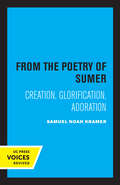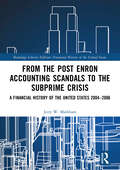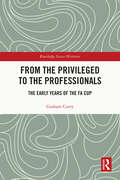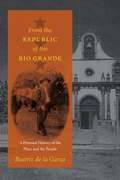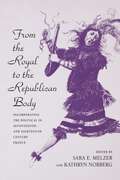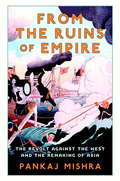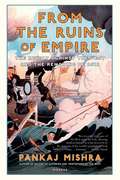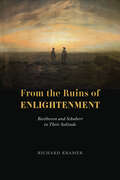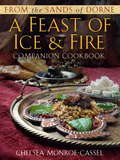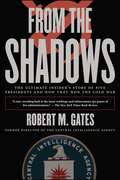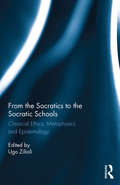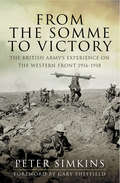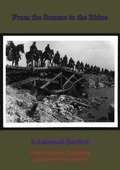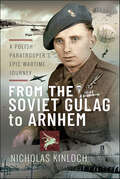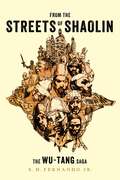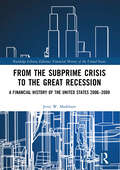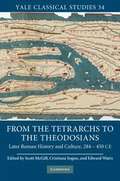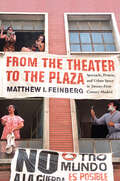- Table View
- List View
From the Poetry of Sumer: Creation, Glorification, Adoration (Una's Lectures #2)
by Samuel Noah KramerThis title is part of UC Press's Voices Revived program, which commemorates University of California Press’s mission to seek out and cultivate the brightest minds and give them voice, reach, and impact. Drawing on a backlist dating to 1893, Voices Revived makes high-quality, peer-reviewed scholarship accessible once again using print-on-demand technology. This title was originally published in 1979.
From the Post Enron Accounting Scandals to the Subprime Crisis: A Financial History of the United States 2004–2006 (Financial History of the United States)
by Jerry W. MarkhamOriginally published in 2011, this volume examines the Enron-era scandals and several corporate governance issues that were raised as a result of these scandals. It then describes developments in the securities and derivatives markets, covering hedge funds, venture capital, private equity and sovereign wealth funds.
From the Privileged to the Professionals: The Early Years of the FA Cup (Routledge Soccer Histories)
by Graham CurryThis book is concerned with the early years of the Football Association Challenge Cup – more commonly known as the FA Cup – examining events from its inception in 1871–2 to the beginning of the Football League in 1888–9. The work is underpinned by the figurational sociology of Norbert Elias, employing his ideas around the European 'civilising process', power and lengthening chains of human interdependency. Most of all, the majority of the text has been compiled using primary source material, such as newspaper reports and the minutes of the Football Association, which encourages original and unique additions to the body of knowledge. There exist no comparable offerings on the time period involved, with the book providing a distinct perspective for scholars and non-specialists alike. The initial years of the competition were dominated by teams consisting mainly of upper-middle-class southern amateurs. However, by the early 1880s, they were supplanted by men who were initially covert– and eventually overt – professionals, many of whom hailed from Scotland, but mainly represented clubs from Lancashire and the West Midlands. The FA Cup, despite losing some of its allure when compared to competitions such as the UEFA Champions League, still retains a magic of its own in the English football calendar.
From the Ptolemies to the Romans
by Andrew MonsonThis book gives a structured account of Egypt's transition from Ptolemaic to Roman rule by identifying key relationships between ecology, land tenure, taxation, administration and politics. It introduces theoretical perspectives from the social sciences and subjects them to empirical scrutiny using data from Greek and Demotic papyri as well as comparative evidence. Although building on recent scholarship, it offers some provocative arguments that challenge prevailing views. For example, patterns of land ownership are linked to population density and are seen as one aspect of continuity between the Ptolemaic and Roman period. Fiscal reform, by contrast, emerges as a significant mechanism of change not only in the agrarian economy but also in the administrative system and the whole social structure. Anyone seeking to understand the impact of Roman rule in the Hellenistic east must consider the well-attested processes in Egypt that this book seeks to explain.
From the Realm of a Dying Sun: The IV. SS-Panzerkorps in the Budapest Relief Efforts, December 1944–February 1945
by Douglas E. Nash Sr.“A veritable tour de force of Eastern Front armored combat replete with slashing counterattacks, defending to the last man, and overcoming odds.” —Mark J. Reardon, author of Victory at MortainOn Christmas Eve 1944, the men of the IV. SS-Panzerkorps and its two divisions—the 3rd SS Panzer Division “Totenkopf” and the 5th SS Panzer Division “Wiking”—were eagerly anticipating what the holiday would bring, including presents from home and perhaps sharing a bottle of schnapps or wine with their comrades.This was not to be, for that very evening, the corps commander, SS-Obergruppenführer Herbert Otto Gille, received a telephone call notifying him that the 35,000 men of his corps would begin boarding express trains the following day that would take them from the relative quiet of the Vistula Front to the front lines in Hungary, hundreds of kilometers away. Their mission: Relieve Budapest! Thus would begin the final round in the saga of the IV. SS-Panzerkorps. In Hungary, it would play a key role in the three attempts to raise the siege of that fateful city. Threatened as much by their high command as by the forces of the Soviet Union, Gille and his troops overcame seemingly insurmountable obstacles in their attempts to rescue the city’s garrison, only to have their final attack called off at the last minute. At that moment, they were only a few kilometers away from the objective towards which they had striven for nearly a month. After the relief attempt’s failure sealed the fate of hundreds of thousands of Hungarians and Germans, the only course of action remaining was to dig in and protect the Hungarian oilfields as long as possible.
From the Renaissance to England's Golden Age
by Core FoundationFrom the Renaissance to England's Golden Age is a single book that, in three sections-on the Renaissance, the Reformation, and England's Golden Age-tells the story of a time of dynamic political, religious, and artistic change in Europe that had far-reaching consequences for the shaping of the modern world. Young readers are introduced to great Renaissance artists (including Raphael, Michelangelo, and Leonardo da Vinci); key figures of the Reformation (including Gutenberg, Martin Luther, and John Calvin); Copernicus and Galileo; England's Henry VIII, Queen Elizabeth I, Oliver Cromwell, Charles II, and more.
From the Republic of the Rio Grande: A Personal History of the Place and the People
by Beatriz de la GarzaThe Republic of the Rio Grande had a brief and tenuous existence (1838–1840) before most of it was reabsorbed by Mexico and the remainder annexed by the United States, yet this region that straddles the Rio Grande has retained its distinctive cultural identity to the present day. Born on one side of the Rio Grande and raised on the other, Beatriz de la Garza is a product of this region. Her birthplace and its people are the subjects of this work, which fuses family memoir and borderlands history. From the Republic of the Rio Grande brings new insights and information to the study of transnational cultures by drawing from family papers supplemented by other original sources, local chronicles, and scholarly works. De la Garza has fashioned a history of this area from the perspective of individuals involved in the events recounted. The book is composed of nine sections spanning some two hundred years, beginning in the mid-1700s. Each section covers not only a chronological period but also a particular theme relating to the history of the region. De la Garza takes a personal approach, opening most sections with an individual observation or experience that leads to the central motif, whether this is the shared identity of the inhabitants, their pride in their biculturalism and bilingualism, or their deep attachment to the land of their ancestors.
From the River to the Sea: The Untold Story of the Railroad War That Made the West
by John SedgwickA sweeping and lively history of one of the most dramatic stories never told—of the greatest railroad war of all time, fought by the daring leaders of the Santa Fe and the Rio Grande to seize, control, and create the American West. It is difficult to imagine now, but for all of its cloudy peaks and gorgeous coastline, the American West might have been barren tundra as far as most Americans knew well into the 19th century. While gauzy advertising promotions of the West as a paradise on earth intrigued citizens in the East and Midwest, many believed the journey too hazardous to be worthwhile—until 1869, when the first transcontinental railroad changed the face of transportation. Railroad companies soon became the rulers of western expansion, choosing routes, creating brand-new railroad towns, and building up remote settlements like Santa Fe, Albuquerque, San Diego, and El Paso into proper cities. But thinning federal grants left the routes incomplete, an opportunity that two brash new railroad men, armed with private investments and determination to build an empire across the Southwest clear to the Pacific, soon seized, leading to the greatest railroad war in American history. In From the River to the Sea, bestselling author John Sedgwick recounts, in vivid and thrilling detail, the decade-long fight between General William J. Palmer, the Civil War hero leading the &“little family&” of his Rio Grande, coming down from Denver, hoping to showcase the majesty of the Rockies, and William Barstow Strong, the hard-nosed manager of the corporate-minded Santa Fe, venturing west from Kansas. What begins as an accidental rivalry when the two lines cross in Colorado soon evolves into an all-out battle as each man tries to outdo the other—claiming exclusive routes through mountains, narrow passes, and the richest silver mines in the world; enlisting private armies to protect their land and lawyers to find loopholes; dispatching spies to gain information; and even using the power of the press and incurring the wrath of the God-like Robber Baron Jay Gould—to emerge victorious. By the end of the century, one man will fade into anonymity and disgrace. The other will achieve unparalleled success—and in the process, transform a sleepy backwater of thirty thousand called &“Los Angeles&” into a booming metropolis that will forever change the United States. Filled with colorful characters and high drama, told at the speed of a locomotive, From the River to the Sea is an unforgettable piece of American history—and one of the last great untold tales of the Wild West.
From the Royal to the Republican Body: Incorporating the Political in Seventeenth- and Eighteenth-Century France
by Sara E. Melzer Kathryn NorbergIn this innovative volume, leading scholars examine the role of the body as a primary site of political signification in seventeenth- and eighteenth-century France. Some essays focus on the sacralization of the king's body through a gendered textual and visual rhetoric. Others show how the monarchy mastered subjects' minds by disciplining the body through dance, music, drama, art, and social rituals. The last essays in the volume focus on the unmaking of the king's body and the substitution of a new, republican body. Throughout, the authors explore how race and gender shaped the body politic under the Bourbons and during the Revolution. This compelling study expands our conception of state power and demonstrates that seemingly apolitical activities like the performing arts, dress and ritual, contribute to the state's hegemony. From the Royal to the Republican Body will be an essential resource for students and scholars of history, literature, music, dance and performance studies, gender studies, art history, and political theory.
From the Ruins of Empire
by Pankaj MishraThe Victorian period, viewed in the West as a time of self-confident progress, was experienced by Asians as a catastrophe. As the British gunned down the last heirs to the Mughal Empire, burned down the Summer Palace in Beijing, or humiliated the bankrupt rulers of the Ottoman Empire, it was clear that for Asia to recover a vast intellectual effort would be required.Pankaj Mishra's fascinating, highly entertaining new book tells the story of a remarkable group of men from across the continent who met the challenge of the West. Incessantly travelling, questioning and agonising, they both hated the West and recognised that an Asian renaissance needed to be fuelled in part by engagement with the enemy. Through many setbacks and wrong turns, a powerful, contradictory and ultimately unstoppable series of ideas were created that now lie behind everything from the Chinese Communist Party to Al Qaeda, from Indian nationalism to the Muslim Brotherhood.Mishra allows the reader to see the events of two centuries anew, through the eyes of the journalists, poets, radicals and charismatics who criss-crossed Europe and Asia and created the ideas which lie behind the powerful Asian nations of the twenty-first century.
From the Ruins of Empire: The Revolt Against the West and the Remaking of Asia
by Pankaj MishraA little more than a century ago, independent thinkers across Asia sought to frame a distinct intellectual tradition that would inspire the continent's rise to dominance. Yet this did not come to pass, and today those thinkers--Tagore, Gandhi, and later Nehru in India; Liang Qichao and Sun Yat-sen in China; Jamal al-Din al-Afghani and Abdurreshi al Ibrahim of the Ottoman Empire--are seen as outsiders within the main anticolonial tradition. But as Pankaj Mishra demonstrates in this enthralling portrait of like minds, Asia's revolt against the West is not the one led by faith-fired terrorists and thwarted peasants; rather, it is rooted in the ideas of these once renowned intellectuals. Now, when the ascendency of Asia seems possible as never before, From the Ruins of Empire is as necessary as it is timely--a book indispensable to our understanding of the world and our place in it.
From the Ruins of Enlightenment: Beethoven and Schubert in Their Solitude
by Richard KramerRichard Kramer follows the work of Beethoven and Schubert from 1815 through to the final months of their lives, when each were increasingly absorbed in iconic projects that would soon enough inspire notions of “late style.” Here is Vienna, hosting a congress in 1815 that would redraw national boundaries and reconfigure the European community for a full century. A snapshot captures two of its citizens, each seemingly oblivious to this momentous political environment: Franz Schubert, not yet twenty years old and in the midst of his most prolific year—some 140 songs, four operas, and much else; and Ludwig van Beethoven, struggling through a midlife crisis that would yield the song cycle An die ferne Geliebte, two strikingly original cello sonatas, and the two formidable sonatas for the “Hammerklavier,” opp. 101 and 106. In Richard Kramer’s compelling reading, each seemed to be composing “against”—Beethoven, against the Enlightenment; Schubert, against the looming presence of the older composer even as his own musical imagination took full flight.From the Ruins of Enlightenment begins in 1815, with the discovery of two unique projects: Schubert’s settings of the poems of Ludwig Hölty in a fragmentary cycle and Beethoven’s engagement with a half dozen poems by Johann Gottfried Herder. From there, Kramer unearths previously undetected resonances and associations, illuminating the two composers in their “lonely and singular journeys” through the “rich solitude of their music.”
From the Sands of Dorne: A Feast of Ice & Fire Companion Cookbook
by Chelsea Monroe-CasselPrepare your palette for more than a dozen all-new recipes in this eBook-exclusive companion to the official Game of Thrones cookbook! Discover the tastes of Dorne, including one dish from The Winds of Winter, the highly anticipated next chapter of George R. R. Martin's beloved series, A Song of Ice and Fire. The most culturally distinct region of the Seven Kingdoms, Dorne is the sun-soaked desert land characterized by its unique customs and brash resistance to the Iron Throne. The Dornish people are known for their bold passions--perhaps best exemplified by the Red Viper himself, Oberyn Martell--and this fiery temperament has yielded a perfect pairing: their delicious cuisine. Packed with fresh flavor, zesty seasonings, and plenty of heat, this eclectic sampling of Southern delights can be enjoyed all year round, with savory fare to warm your bones in Winterfell and frozen desserts to help you keep cool in Sunspear. Inside, you'll find: * Succulent starters: Lemon-Egg Soup; Spicy Shrimp; Roasted Chickpeas. * Mediterranean-style mains: Lamb with Honey, Lemon, and Fiery Peppers; Eggs and Spicy Sausage; Green Peppers Stuffed with Cheese; Spicy Flatbread. * Tasty treats: Blood-Orange Granita; Candied Kumquats; Figs Stuffed with Nuts. With all the imagination, authenticity, and tongue-in-cheek humor that won A Feast of Ice and Fire a cult following, From the Sands of Dorne is an oasis for foodies everywhere.
From the Shadows (A Billy Boyle WWII Mystery #17)
by James R. BennIn southern France in 1944, Captain Billy Boyle works with French Resistance fighters to protect a Royal Navy Commander, uncovering a wide web of subterfuge and betrayal in the process.Southern France, 1944: What should be a simple assignment with a Special Operations Executive officer gets complicated quickly as Billy navigates the tensions between Resistance groups in the process of gathering information on Vichy officials and other collaborators who escaped with the retreating Germans. Unexpectedly, the SOE officer has many enemies in the Resistance, linked to the failed Vercors uprising. Diana Seaton, Billy&’s wartime lover, crosses paths with him as she and legendary SOE agent Christine Granville embark on a humanitarian mission on behalf of those killed while helping the SOE. The search for a witness to a deadly explosion leads Billy to the legendary 442nd Regimental Combat Team, a unit made up of Nisei soldiers that became the most highly decorated unit in the history of the US Army. With sacrifice and betrayal afoot, Billy doesn&’t know who he can trust, or how close to death this case may bring him.
From the Shadows: The Ultimate Insider's Story of Five Presidents and How They Won the Cold War
by Robert M. GatesAs the only person to rise from entry-level analyst to Director of the CIA and to serve on the White House staffs of four Presidents, Robert Gates is uniquely qualified to tell the unprecedented inside story of the Cold War. Drawing on his access to classified information and top-level involvement in policy decisions, Gates lays bare the hidden wars and operations the United States wages against communism worldwide. Ever certain that the fifty-year struggle with the Soviet Union was indeed a war, Gates makes candid appraisals of Presidents, key officials, and policies of the period. From the Shadows is a classic memoir on the career of a CIA officer at the centre of power during a time when the threat of global annihilation informed America's every move.
From the Skies: Australian air power in humanitarian aid and disaster relief since the Second World War
by Karyn MarkwellFrom the Skies explores the role of Australian air power in humanitarian aid and disaster relief (HADR) since the Second World War: how Australia uses aircraft to aid those in need following disasters, both overseas and within its own borders. This book demonstrates that all three Australian Defence Force (ADF) services – the Royal Australian Navy, the Australian Army and the Royal Australian Air Force – provide Australia&’s military aviation HADR capability, while Australia&’s flagship airline, Qantas, has historically been the predominant HADR provider among Australia&’s commercial airlines. From the Skies features firsthand stories by members of the ADF: accounts by Australian men and women who help to save lives, search for survivors, repatriate the bodies of their fellow Australians and prevent disasters from becoming even greater. All stories are told in their own words with professional insight, great sensitivity and an awareness that they were privileged to help others on behalf of Australia and the ADF. This book further explores why Australia is likely to continue to engage in HADR in the future and why air power will be a key enabler of Australia&’s future HADR efforts. As part of this, it addresses new and emerging aviation technologies, including advanced intelligence, surveillance and reconnaissance capabilities.ABOUT THE SERIESThe Australian Air Campaign Series (AACS) produced by Air Force&’s History and Heritage Branch consists of well researched books on RAAF history that arenot only underpinned by rigorous scholarship and solid evidence, but also are readable, well-illustrated, educational and enduring. The intent of the AACS is to promote an understanding of Air Force history by examining the Air Force&’s development, performance, heritage, and contribution to the Nation in war and peace. By using examples of air operations and exploring the use of the Air Force, these publications contribute to the professional military education of Air Force members, and the education of those with an interest in Air Force history. The AACS is comprised of four sub-series of titles, as shown below. Through the Collection of works in each of these sub-series, the reader gains an appreciation of the depth and breadth of the facets that have formed the history and heritage of the RAAF over the past 100 years.
From the Socratics to the Socratic Schools: Classical Ethics, Metaphysics and Epistemology
by Ugo ZilioliIn the two golden centuries that followed the death of Socrates, ancient philosophy underwent a tremendous transformation that culminated in the philosophical systematizations of Plato, Aristotle and the Hellenistic schools. Fundamental figures other than Plato were active after the death of Socrates; his immediate pupils, the Socratics, took over his legacy and developed it in a variety of ways. This rich philosophical territory has however been left largely underexplored in the scholarship. This collection of eleven previously unpublished essays by leading scholars fills a gap in the literature, providing new insight into the ethics, metaphysics, and epistemology as developed by key figures of the Socratic schools. Analyzing the important contributions that the Socratics and their heirs have offered ancient philosophical thought, as well as the impact these contributions had on philosophy as a discipline, this book will appeal to researchers and scholars of Classical Studies, as well as Philosophy and Ancient History.
From the Somme to Victory: The British Army's Experience on the Western Front 1916–1918
by Peter SimkinsPeter Simkins has established a reputation over the last forty years as one of the most original and stimulating historians of the First World War. He has made a major contribution to the debate about the performance of the British Army on the Western Front. This collection of his most perceptive and challenging essays, which concentrates on British operations in France between 1916 and 1918, shows that this reputation is richly deserved. He focuses on key aspects of the army's performance in battle, from the first day of the Somme to the Hundred Days, and gives a fascinating insight into the developing theory and practice of the army as it struggled to find a way to break through the German line. His rigorous analysis undermines some of the common assumptions - and the myths - that still cling to the history of these British battles.
From the Somme to the Rhine
by Seabury H Ashmead-BartlettThe author joined the war effort only late in the war in 1918., He was witness to the last disintegrations of the German war machine as the Allied forces finally pushed into Germany itself. As an officer of the 173rd brigade, 58th Division, he was at the forefront of the advance at many points, seeing the horrors of the war for the first time. Unlike many wartime memoirs of the First World War, Ashmead-Barlett recounts his experiences in Germany, offering some idea of what the war must have been like for the civilian population.His writing is fresh and immediate: not desensitised by years of fighting, he is very frank about the brutalities and horrors of the last months of the War.Author -- Ashmead-Bartlett (later Burdett-Coutts), Seabury H., 1887-Text taken, whole and complete, from the edition published in London: John Lane; 1921.Original Page Count - 205 pages.
From the Soviet Gulag to Arnhem: A Polish Paratrooper's Epic Wartime Journey
by Nicholas KinlochAs featured on TV. The incredible true story of a teenage boy’s perilous journey around the world during World War Two. “A tale of determination and triumph” – Kay Burley, Sky News Stan was aged 15 when war broke out. Over a period of 5 years, he dodged death as he travelled thousands of kilometres from Poland to the UK, via Soviet gulags, Uzbekistan, the Middle East and India. He then trained as a paratrooper in Scotland. He met a local girl and was going to get married, but had to leave her behind when he was dropped into battle at Arnhem. He was trapped behind enemy lines and captured by the Nazis. Only the Dutch underground might be able to help him escape. This thrilling memoir is an inspiring and personal account of a triumph of resilience and courage against great odds.
From the Spitfire Cockpit to the Cabinet Office: The Memoirs of Air Commodore J F 'Johnny' Langer CBE AFC DL
by J. F. LangerAir Commodore John Langer's career has been eventful to say the least. During the Second World War he flew gliders in India in preparation for airborne assaults in Burma, one of the most perilous landscapes to pass across during this time. Post-war, he served on a fighter squadron in Germany and in Malaya, where he was recommended for an AFC. Later on, he commanded No 43 (F) Squadron, the famous 'Fighting Cocks', and was awarded the AFC. As a Group Captain, he commanded RAF Valley and was awarded the CBE. He ended his RAF career as director of Flying Training where he set up the first team of the Red Arrows. By careers end, he had flown fifty-six different types of aircraft.On leaving the RAF, he became the Civil Aviation Security Adviser to the UK Government, serving for eight years as a Crown Servant and a further seven years as a consultant. He was a frequent advisor to the Cabinet Office Briefing Room 'A' (Cobra), consulting with members of the cabinet on national and international aviation matters in the wake of a series of security and terrorist emergencies. In 1993 he was appointed Duty Lieutenant for Greater London, with responsibilities for the borough of Hillingdon, location of both Heathrow and Northolt airport. He looked after members of the Royal Family in their departures from these airports and became a good friend of Princess Diana, chaperoning her on a number of solo outings. Interesting details relating to some of their exchanges are included here. This is a unique autobiography, taking in a vast spectrum of events and experiences. It is also an important record of political, aviation and social history and should appeal to enthusiasts of all these areas of interest.
From the Streets of Shaolin: The Wu-Tang Saga
by S. H. Fernando Jr.This definitive biography of rap supergroup, Wu-Tang Clan, features decades of unpublished interviews and unparalleled access to members of the group and their associates.This is the definitive biography of rap supergroup and cultural icons, Wu-Tang Clan (WTC). Heralded as one of the most influential groups in modern music—hip hop or otherwise—WTC created a rap dynasty on the strength of seven gold and platinum albums that launched the careers of such famous rappers as RZA, GZA, Ol' Dirty Bastard, Raekwon, Ghostface Killah, Method Man, and more. During the &‘90s, they ushered in a hip-hop renaissance, rescuing rap from the corporate suites and bringing it back to the gritty streets where it started. In the process they changed the way business was conducted in an industry known for exploiting artists. Creatively, Wu-Tang pushed the boundaries of the artform dedicating themselves to lyrical mastery and sonic innovation, and one would be hard pressed to find a group who's had a bigger impact on the evolution of hip hop.S.H. Fernando Jr., a veteran music journalist who spent a significant amount of time with The Clan during their heyday of the &‘90s, has written extensively about the group for such publications as Rolling Stone, Vibe, and The Source. Over the years he has built up a formidable Wu-Tang archive that includes pages of unpublished interviews, videos of the group in action in the studio, and several notepads of accumulated memories and observations. Using such exclusive access as well as the wealth of open-source material, Fernando reconstructs the genesis and evolution of the group, delving into their unique ideology and range of influences, and detailing exactly how they changed the game and established a legacy that continues to this day. The book provides a startling portrait of overcoming adversity through self-empowerment and brotherhood, giving us unparalleled insights into what makes these nine young men from the ghetto tick. While celebrating the myriad accomplishments of The Clan, the book doesn't shy away from controversy—we're also privy to stories from their childhoods in the crack-infested hallways of Staten Island housing projects, stints in Rikers for gun possession, and million-dollar contracts that led to recklessness and drug overdoses (including Ol' Dirty Bastard's untimely death). More than simply a history of a single group, this book tells the story of a musical and cultural shift that started on the streets of Shaolin (Staten Island) and quickly spread around the world.Biographies on such an influential outfit are surprisingly few, mostly focused on a single member of the group's story. This book weaves together interviews from all the Clan members, as well as their friends, family and collaborators to create a compelling narrative and the most three-dimensional portrait of Wu-Tang to date. It also puts The Clan within a social, cultural, and historical perspective to fully appreciate their impact and understand how they have become the cultural icons they are today. Unique in its breadth, scope, and access, From The Streets of Shaolin is a must-have for fans of WTC and music bios in general.
From the Subprime Crisis to the Great Recession: A Financial History of the United States 2006–2009 (Financial History of the United States)
by Jerry W. MarkhamOriginally published in 2010, this book covers the development of the mortgage market, the residential housing boom and bust that led to the subprime crisis, and the effect of this crisis on financial institutions as well as the stock market panic of 2008. It details the massive government interventions that sought to prevent another Great Depression.
From the Tetrarchs to the Theodosians: Later Roman History and Culture, 284-450 CE
by Scott Mcgill Cristiana Sogno Edward WattsAn integrated collection of essays examining the politics, social networks, law, historiography, and literature of the later Roman world. The volume treats three central themes: the first section looks at political and social developments across the period and argues that, in spite of the stress placed upon traditional social structures, many elements of Roman life remained only slightly changed. The second section focuses upon biographical texts and shows how late-antique authors adapted traditional modes of discourse to new conditions. The final section explores the first years of the reign of Theodosius I and shows how he built upon historical foundations while unfurling new methods for utilising, presenting, and commemorating imperial power. These papers analyse specific events and local developments to highlight examples of both change and continuity in the Roman world from 284-450.
From the Theater to the Plaza: Spectacle, Protest, and Urban Space in Twenty-First-Century Madrid (McGill-Queen's Iberian and Latin American Cultures Series)
by Matthew I. FeinbergLavapiés - diverse, multicultural, and one of Madrid’s most iconic neighbourhoods - has emerged as a locus of resistance movements and of cultural flourishing. Poised at the intersection of theatre studies and cultural geography, this innovative study sketches its physical and imaginary contours.In From the Theater to the Plaza Matthew Feinberg guides readers on a journey through the development of the theatre, as both art and space, in Lavapiés. Offering a detailed analysis of dramatic texts and productions, performance spaces, urban planning documents, and the cultural activities of squatters, Feinberg sheds new light on the lead-up to Spain’s economic crisis and the emergence in 2011 of the 15-M anti-austerity protest movement. The result is a multidisciplinary account of how the spectacle of the contemporary city connects local, municipal, and global geographies.By linking the neighbourhood’s unique role as both a site and a subject of Madrid’s theatre tradition with its contemporary struggles over gentrification, From the Theater to the Plaza offers new approaches for understanding how culture and capital produce the twenty-first-century city.
